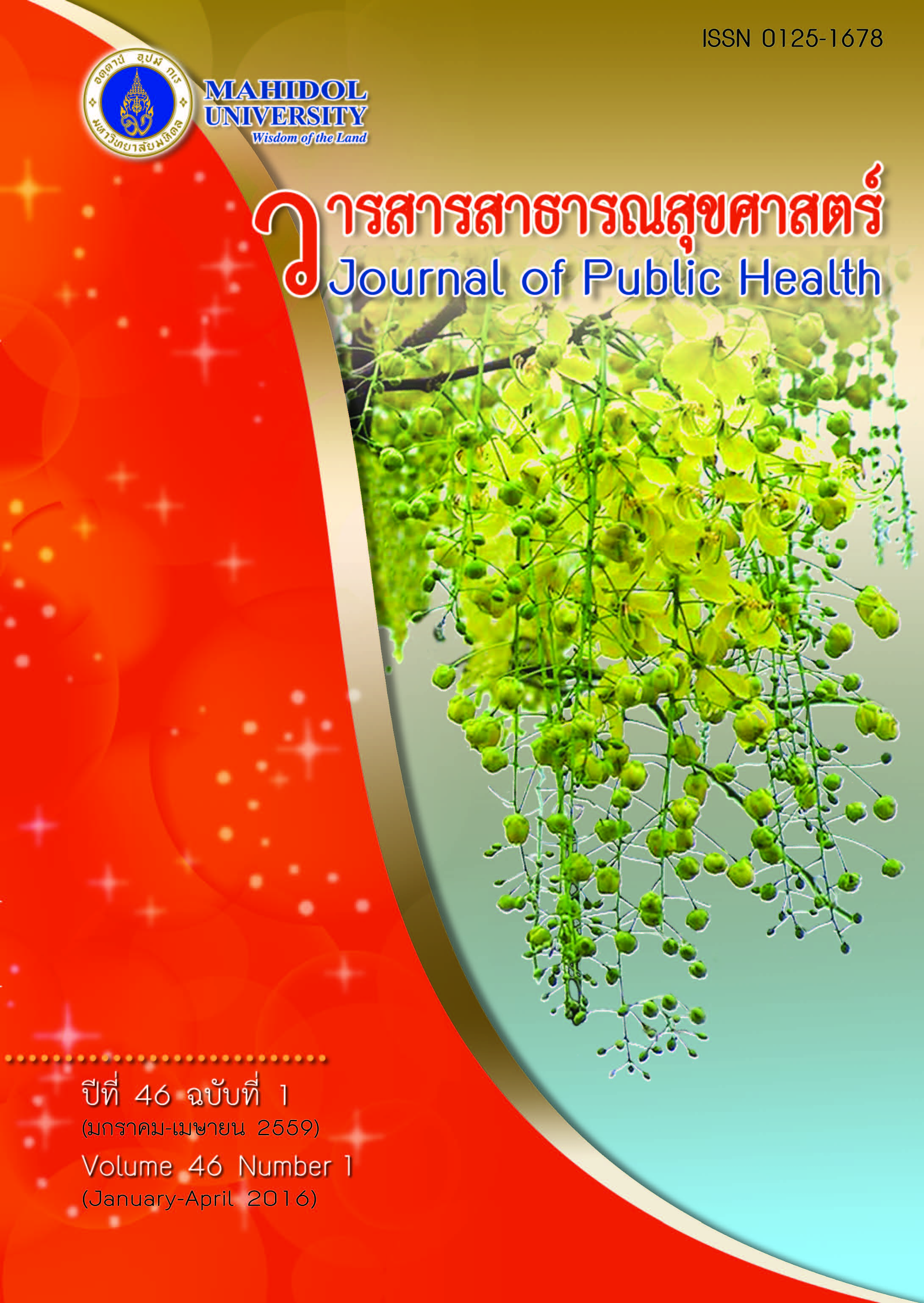ปัญหาและอุปสรรคของการบริหารจัดการวัคซีนป้องกันไข้หวัดใหญ่ในประเทศไทย
Keywords:
วัคซีนป้องกันไข้หวัดใหญ่, การบริหารจัดการ, ปัญหา, อุปสรรค, ประเทศไทย, influenza vaccine, management, difficulty, obstacle, ThailandAbstract
บทคัดย่อ
ไข้หวัดใหญ่เป็นปัญหาสาธารณสุขที่สำคัญ เนื่องจากเป็นสาเหตุการเสียชีวิตในประชากรกลุ่มเสี่ยง เกือบทศวรรษที่ประเทศไทยให้บริการวัคซีนป้องกันไข้หวัดใหญ่ในประชากรกลุ่มนี้ แต่ความครอบคลุมยังต่ำกว่าเป้าหมาย ความเข้าใจในรูปแบบการดำเนินงาน และปัญหาอุปสรรค จึงเป็นสิ่งสำคัญที่ช่วยปรับปรุงการดำเนินงานให้บริการวัคซีนป้องกันไข้หวัดใหญ่ การวิจัยเชิงคุณภาพมีวัตถุประสงค์เพื่ออธิบายแนวทางการดำเนินงาน ปัญหา อุปสรรค ในการให้บริการวัคซีนป้องกันไข้หวัดใหญ่ตามฤดูกาลในประชากรกลุ่มเสี่ยง เก็บรวมรวมข้อมูลด้วยการสัมภาษณ์เชิงลึกผู้บริหาร และผู้ปฏิบัติงานระดับเขต จังหวัด และอำเภอ ใน 12 จังหวัดของประเทศไทย โดยใช้แนวคำถามจากผู้ให้สัมภาษณ์จำนวน 82 คน พบประเด็นที่อาจมีผลต่อความครอบคลุมของวัคซีนดังนี้ นิยามของกลุ่มเสี่ยงขาดความชัดเจนและสอดคล้องระหว่างหน่วยงานระดับนโยบาย การจัดส่งวัคซีนล่าช้ากว่าแผนการรณรงค์ทำให้กลุ่มเป้าหมายปฏิเสธการรับบริการ ขาดช่องทางได้รับข้อมูลการจัดส่งวัคซีนของหน่วยงานระดับเขต จังหวัด และอำเภอ ทำให้การบริหารจัดการวัคซีนระหว่างพื้นที่ขาดประสิทธิภาพ หน่วยบริการในระดับอำเภอและตำบลไม่สามารถดำเนินการตามแนวทางการให้บริการได้ เนื่องจากขาดแคลนบุคลากรทางการแพทย์ ดังนั้นคณะอนุกรรมการสร้างเสริมภูมิคุ้มกันโรคควรเป็นผู้กำหนดนิยามของกลุ่มเป้าหมาย เพื่อให้การดำเนินงานเป็นไปในทิศทางเดียวกัน สำนักงานหลักประกันสุขภาพและกรมควบคุมโรคควรพิจารณาปรับแนวทางการให้บริการวัคซีนป้องกันไข้หวัดใหญ่ เพื่อปรับปรุงการดำเนินการให้ครอบคลุมกลุ่มเป้าหมายได้มากขึ้น
Difficulties and Obstacles of Influenza Vaccine Management in Thailand
ABSTRACT
Due to complication-related deaths in high risk populations, influenza has been a major problem worldwide. To reduce influenza mortality, Thailand has implemented influenza vaccination programs among high risk populations for a decade; however, coverage has not yet reached the national goal. Understanding patterns, difficulties and obstacles of vaccination management may provide significant information to improve management effectiveness and increase vaccine coverage afterward. This qualitative research aimed to describe patterns, and evaluate management of seasonal influenza vaccination programs. Data was collection in 12 provinces and in-depth interviews were conducted among representatives of public health organizations and health service units at regional, provincial and district levels using guidelines. From 82 key informants, this study revealed several issues for consideration including inconsistency of definitions and specifications for population at risk and delayed vaccine delivery to health service units related to refused vaccinations in high risk populations. In addition, lack of information on vaccine allocation and delivery for administrators and coordinators at regional, provincial and district levels caused ineffective vaccine management in some areas. Health service units at district and subdistrict level could not follow the guidelines of vaccination practices because of human resource constraints. The Thai National Vaccine Committee should define target populations for influenza vaccination to direct operations at local level to increase consistency. To achieve vaccine coverage goals, the National Health Security Office and Ministry of Public Health should improve proper guidelines to manage influenza vaccination.
Downloads
Published
Issue
Section
License
Creative Commons License CC-BY-ND


